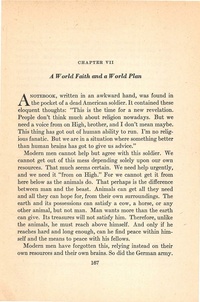This Earth One Country/A world faith and a world plan
The text below this notice was generated by a computer, it still needs to be checked for errors and corrected. If you would like to help, view the original document by clicking the PDF scans along the right side of the page. Click the edit button at the top of this page (notepad and pencil icon) or press Alt+Shift+E to begin making changes. When you are done press "Save changes" at the bottom of the page. |
CHAPTER VII
A World Faith and a World Plan
NOTEBOOK, written in an awkward hand, was found in A the pocket of a dead American soldier. It contained these eloquent thoughts: “This is the time for a new revelation. People don’t think much about religion nowadays. But we need a voice from on High, brother, and I don’t mean maybe. This thing has got out of human ability to run. I’m no religious fanatic. But we are in a situation where something better than human brains has got to give us advice.”
Modern men cannot help but agree with this soldier. We cannot get out of this mess depending solely upon our own resources. That much seems certain. We need help urgently, and we need it “from on High.” For we cannot get it from here below as the animals do. That perhaps is the difference between man and the beast. Animals can get all they need and all they can hope for, from their own surroundings. The earth and its possessions can satisfy a cow, a horse, or any other animal, but not man. Man wants more than the earth can give. Its treasures will not satisfy him. Therefore, unlike the animals, he must reach above himself. And only if he reaches hard and long enough, can he find peace within himself and the means to peace with his fellows.
Modern men have forgotten this, relying instead on their own resources and their own brains. So did the German army.
167
[Page 168]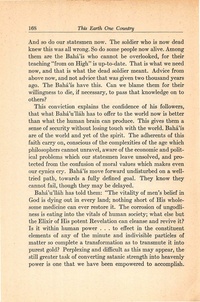 168 This Earth One Country
168 This Earth One Country
And so do our statesmen now. The soldier who is now dead knew this was all wrong. So do some people now alive. Among them are the Baha’is who cannot be overlooked, for their teaching “from on High” is up-to-date. That is what we need now, and that is what the dead soldier meant. Advice from above now, and not advice that was given two thousand years ago. The Baha’is have this. Can we blame them for their willingness to die, if necessary, to pass that knowledge on to others?
This conviction explains the confidence of his followers, that what Baha’u’llah has to offer to the world now is better than what the human brain can produce. This gives them a sense of security without losing touch with the world. Baha’is are of the world and yet of the spirit. The adherents of this faith carry on, conscious of the complexities of the age which philosophers cannot unravel, aware of the economic and political problems which our statesmen leave unsolved, and protected from the confusion of moral values which makes even our cynics cry. Baha’is move forward undisturbed on a welltried path, towards a fully defined goal. They know they cannot fail, though they may be delayed.
Baha’u'llah has told them: “The vitality of men’s belief in
God is dying out in every land; nothing short of His wholesome medicine can ever restore it. The corrosion of ungodliness is eating into the vitals of human society; what else but
the Elixir of His potent Revelation can cleanse and revive it?
Is it within human power .. . to effect in the constituent
elements of any of the minute and indivisible particles of
matter so complete a transformation as to transmute it into
purest gold? Perplexing and difficult as this may appear, the
still greater task of converting satanic strength into heavenly
power is one that we have been empowered to accomplish.
[Page 169]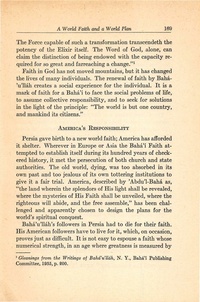 A World Faith and a World Plan 5 169
A World Faith and a World Plan 5 169
The Force capable of such a transformation transcendeth the potency of the Elixir itself. The Word of God, alone, can claim the distinction of being endowed with the capacity required for so great and farreaching a change.”*
Faith in God has not moved mountains, but it has changed the lives of many individuals. The renewal of faith by Baha*u’llah creates a social experience for the individual. It is a mark of faith for a Baha’i to face the social problems of life, to assume collective responsibility, and to seek for solutions in the light of the principle: “The world is but one country, and mankind its citizens.”
America’s RESPONSIBILITY
Persia gave birth to a new world faith; America has afforded it shelter. Wherever in Europe or Asia the Baha’i Faith attempted to establish itself during its hundred years of checkered history, it met the persecution of both church and state authorities. The old world, dying, was too absorbed in its own past and too jealous of its own tottering institutions to give it a fair trial. America, described by ’Abdu’l-Baha as, “the land wherein the splendors of His light shall be revealed, where the mysteries of His Faith shall be unveiled, where the righteous will abide, and the free assemble,” has been challenged and apparently chosen to design the plans for the world’s spiritual conquest.
Baha’u’llah’s followers in Persia had to die for their faith. His American followers have to live for it, which, on occasion, proves just as difficult. It is not easy to espouse a faith whose numerical strength, in an age where greatness is measured by
- Gleanings from the Writings of Bahd’w'llah, N. Y., Baha’i Publishing
Committee, 1935, p. 200.
[Page 170]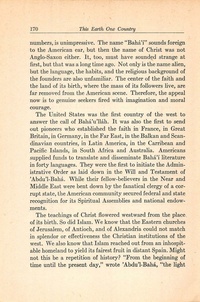 \
\
170 This Earth One Country
999 1
numbers, is unimpressive. The name “Baha’i’” sounds foreign to the American ear, but then the name of Christ was not Anglo-Saxon either. It, too, must have sounded strange at first, but that was a long time ago. Not only is the name alien, but the language, the habits, and the religious background of the founders are also unfamiliar. The center of the faith and the land of its birth, where the mass of its followers live, are far removed from the American scene. Therefore, the appeal now is to genuine seekers fired with imagination and moral courage.
The United States was the first country of the west to answer the call of Baha’u’lla4h. It was also the first to send out pioneers who established the faith in France, in Great Britain, in Germany, in the Far East, in the Balkan and Scandinavian countries, in Latin America, in the Carribean and Pacific Islands, in South Africa and Australia. Americans supplied funds to translate and disseminate Baha'i literature in forty languages. They were the first to initiate the Administrative Order as laid down in the Will and Testament of
- Abdu’l-Baha. While their fellow-believers in the Near and
Middle East were bent down by the fanatical clergy of a corrupt state, the American community secured federal and state recognition for its Spiritual Assemblies and national endowments.
The teachings of Christ flowered westward from the place,
of its birth. So did Islam. We know that the Eastern churches
of Jerusalem, of Antioch, and of Alexandria could not match
in splendor or effectiveness the Christian institutions of the
west. We also know that Islam reached out from an inhospitable homeland to yield its fairest fruit in distant Spain. Might
not this be a repetition of history? “From the beginning of
time until the present day,” wrote “Abdu’l-Baha, “the light
[Page 171]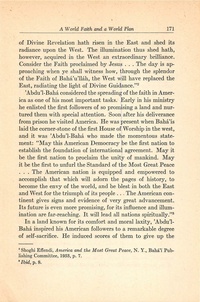 A World Faith and a World Plan 171
A World Faith and a World Plan 171
of Divine Revelation hath risen in the East and shed its radiance upon the West. The illumination thus shed hath, however, acquired in the West an extraordinary brilliance. Consider the Faith proclaimed by Jesus . . . The day is approaching when ye shall witness how, through the splendor of the Faith of Baha’u’ll4h, the West will have replaced the East, radiating the light of Divine Guidance.””
- Abdu’l-Baha considered the spreading of the faith in America as one of his most important tasks. Early in his ministry
he enlisted the first followers of so promising a land and nurtured them with special attention. Soon after his deliverance from prison he visited America. He was present when Bahda’is laid the corner-stone of the first House of Worship in the west, and it was ’Abdu’l-Bahé who made the momentous statement: “May this American Democracy be the first nation to establish the foundation of international agreement. May it be the first nation to proclaim the unity of mankind. May it be the first to unfurl the Standard of the Most Great Peace . .. The American nation is equipped and empowered to accomplish that which will adorn the pages of history, to become the envy of the world, and be blest in both the East and West for the triumph of its people . . . The American continent gives signs and evidence of very great advancement. Its future is even more promising, for its influence and illumination are far-reaching. It will lead all nations spiritually.’”* In a Jand known for its comfort and moral laxity, ’Abdu’lBaha inspired his American followers to a remarkable degree of self-sacrifice. He induced scores of them to give up the
- Shoghi Effendi, America and the Most Great Peace, N. Y., Baha’i Publishing Committee, 1933, p. 7.
- Ibid, p. 8.
[Page 172]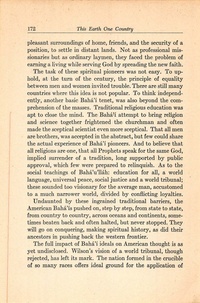 172 This Earth One Country
172 This Earth One Country
pleasant surroundings of home, friends, and the security of a position, to settle in distant lands. Not as professional missionaries but as ordinary laymen, they faced the problem of earning a living while serving God by spreading the new faith.
The task of these spiritual pioneers was not easy. To uphold, at the turn of the century, the principle of equality between men and women invited trouble. There are still many countries where this idea is not popular. To think independently, another basic Baha’i tenet, was also beyond the comprehension of the masses. Traditional religious education was apt to close the mind. The Bahai attempt to bring religion and science together frightened the churchman and often made the sceptical scientist even more sceptical. That all men are brothers, was accepted in the abstract, but few could share the actual experience of Baha’i pioneers. And to believe that all religions are one, that all Prophets speak for the same God, implied surrender of a tradition, long supported by public approval, which few were prepared to relinquish. As to the social teachings of Baha’u’llah: education for all, a world language, universal peace, social justice and a world tribunal; these sounded too visionary for the average man, accustomed to a much narrower world, divided by conflicting loyalties.
Undaunted by these ingrained traditional barriers, the American Baha'is pushed on, step by step, from state to state, from country to country, across oceans and continents, sometimes beaten back and often halted, but never stopped. They will go on conquering, making spiritual history, as did their ancestors in pushing back the western frontier.
The full impact of Baha’i ideals on American thought is as
yet undisclosed. Wilson’s vision of a world tribunal, though
rejected, has left its mark. The nation formed in the crucible
of so many races offers ideal ground for the application of
[Page 173]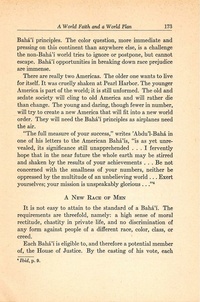 A World Faith and a World Plan 178
A World Faith and a World Plan 178
Baha'i principles. The color question, more immediate and pressing on this continent than anywhere else, is a challenge the non-Baha’i world tries to ignore or postpone, but cannot escape. Baha'i opportunities in breaking down race prejudice are immense.
There are really two Americas. The older one wants to live for itself. It was cruelly shaken at Pearl Harbor. The younger America is part of the world; it is still unformed. The old and sedate society will cling to old America and will rather die than change. The young and daring, though fewer in number, will try to create a new America that will fit into a new world order. They will need the Baha’i principles as airplanes need the air.
“The full measure of your success,” writes ’Abdu’l-Baha in one of his letters to the American Baha’is, “is as yet unrevealed, its significance still unapprehended . . . I fervently hope that in the near future the whole earth may be stirred and shaken by the results of your achievements . . . Be not concerned with the smallness of your numbers, neither be oppressed by the multitude of an unbelieving world .. . Exert yourselves; your mission is unspeakably glorious . . .”*
A New Race or Men
It is not easy to attain to the standard of a Bahai. The requirements are threefold, namely: a high sense of moral rectitude, chastity in private life, and no discrimination of any form against people of a different race, color, class, or creed.
Each Baha’1 is eligible to, and therefore a potential member of, the House of Justice. By the casting of his vote, each
‘ Ibid, p. 9.
[Page 174]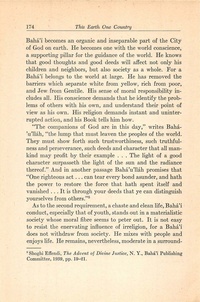 174 ; This Earth One Country
174 ; This Earth One Country
Baha’i becomes an organic and inseparable part of the City of God on earth. He becomes one with the world conscience, a supporting pillar for the guidance of the world. He knows that good thoughts and good deeds will affect not only his children and neighbors, but also society as a whole. For a Baha'i belongs to the world at large. He has removed the barriers which separate white from yellow, rich from poor, and Jew from Gentile. His sense of moral responsibility includes all. His conscience demands that he identify the problems of others with his own, and understand their point of view as his own. His religion demands instant and uninterrupted action, and his Book tells him how.
“The companions of God are in this day,” writes Baha’u'llah, “the lump that must leaven the peoples of the world. They must show forth such trustworthiness, such truthfulness and perseverance, such deeds and character that all mankind may profit by their example . . . The light of a good character surpasseth the light of the sun and the radiance thereof.” And in another passage Baha’u’lla4h promises that “One righteous act ... can tear every bond asunder, and hath the power to restore the force that hath spent itself and vanished ... It is through your deeds that ye can distinguish yourselves from others.’”®
As to the second requirement, a chaste and clean life, Baha’i conduct, especially that of youth, stands out in a materialistic society whose moral fibre seems to peter out. It is not easy to resist the enervating influence of irreligion, for a Baha’i does not withdraw from society. He mixes with people and enjoys life. He remains, nevertheless, moderate in a surround
°Shoghi Effendi, The Advent of Divine Justice, N. Y., Baha’i Publishing
Committee, 1939, pp. 19-21.
[Page 175]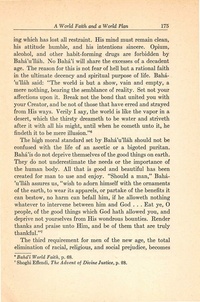 A World Faith and a World Plan 175
A World Faith and a World Plan 175
ing which has lost all restraint. His mind must remain clean, his attitude humble, and his intentions sincere. Opium, alcohol, and other habit-forming drugs are forbidden by Bahé’u’llah. No Baha’i will share the excesses of a decadent age. The reason for this is not fear of hell but a rational faith in the ultimate decency and spiritual purpose of life. Baha*u'llah said: “The world is but a show, vain and empty, a mere nothing, bearing the semblance of reality. Set not your affections upon it. Break not the bond that united you with your Creator, and be not of those that have erred and strayed from His ways. Verily I say, the world is like the vapor in a desert, which the thirsty dreameth to be water and striveth after it with all his might, until when he cometh unto it, he findeth it to be mere illusion.”®
The high moral standard set by Baha’u’llah should not be confused with the life of an ascetic or a bigoted puritan. Baha’is do not deprive themselves of the good things on earth. They do not underestimate the needs or the importance of the human body. All that is good and beautiful has been created for man to use and enjoy. “Should a man,” Baha*u'llah assures us, “wish to adorn himself with the ornaments of the earth, to wear its apparels, or partake of the benefits it can bestow, no harm can befall him, if he alloweth nothing whatever to intervene between him and God... Eat ye, O people, of the good things which God hath allowed you, and deprive not yourselves from His wondrous bounties. Render thanks and praise unto Him, and be of them that are truly thankful.’””
The third requirement for men of the new age, the total elimination of racial, religious, and social prejudice, becomes
° Bahd@i World Faith, p. 68.
- Shoghi Effendi, The Advent of Divine Justice, p. 28.
[Page 176]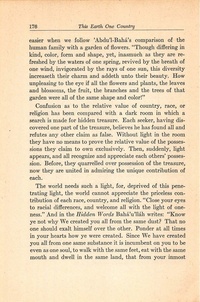 176 This Earth One Country
176 This Earth One Country
easier when we follow ’Abdu’l-Baha’s comparison of the human family with a garden of flowers. “Though differing in kind, color, form and shape, yet, inasmuch as they are refreshed by the waters of one spring, revived by the breath of one wind, invigorated by the rays of one sun, this diversity increaseth their charm and addeth unto their beauty. How unpleasing to the eye if all the flowers and plants, the leaves and blossoms, the fruit, the branches and the trees of that garden were all of the same shape and color!”
Confusion as to the relative value of country, race, or religion has been compared with a dark room in which a search is made for hidden treasure. Each seeker, having discovered one part of the treasure, believes he has found all and refutes any other claim as false. Without light in the room they have no means to prove the relative value of the possessions they claim to own exclusively. Then, suddenly, light appears, and all recognize and appreciate each others’ possession. Before, they quarrelled over possession of the treasure, now they are united in admiring the unique contribution of each.
The world needs such a light, for, deprived of this penetrating light, the world cannot appreciate the priceless contribution of each race, country, and religion. “Close your eyes
to racial differences, and welcome all with the light of oneness.” And in the Hidden Words Baha'u'llah writes: “Know
ye not why We created you all from the same dust? That no
one should exalt himself over the other. Ponder at all times
in your hearts how ye were created. Since We have created
you all from one same substance it is incumbent on you to be
even as one soul, to walk with the same feet, eat with the same
mouth and dwell in the same land, that from your inmost
[Page 177]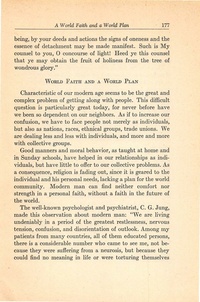 A World Faith and a World Plan aeleng
A World Faith and a World Plan aeleng
being, by your deeds and actions the signs of oneness and the essence of detachment may be made manifest. Such is My counsel to you, O concourse of light! Heed ye this counsel that ye may obtain the fruit of holiness from the tree of wondrous glory.”
Worwpd Farra anp A Worip PLAN
Characteristic of our modern age seems to be the great and complex problem of getting along with people. This difficult question is particularly great today, for never before have we been so dependent on our neighbors. As if to increase our confusion, we have to face people not merely as individuals, but also as nations, races, ethnical groups, trade unions. We are dealing less and less with individuals, and more and more with collective groups.
Good manners and moral behavior, as taught at home and in Sunday schools, have helped in our relationships as individuals, but have little to offer to our collective problems. As a consequence, religion is fading out, since it is geared to the individual and his personal needs, lacking a plan for the world community. Modern man can find neither comfort nor strength in a personal faith, without a faith in the future of the world.
The well-known psychologist and psychiatrist, C. G. Jung,
made this observation about modern man: “We are living
undeniably in a period of the greatest restlessness, nervous
tension, confusion, and disorientation of outlook. Among my
patients from many countries, all of them educated persons,
there is a considerable number who came to see me, not because they were suffering from a neurosis, but because they
could find no meaning in life or were torturing themselves
[Page 178]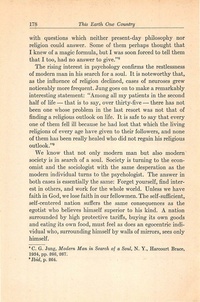 178 This Earth One Country
178 This Earth One Country
with questions which neither present-day philosophy nor religion could answer. Some of them perhaps thought that I knew of a magic formula, but I was soon forced to tell them that I too, had no answer to give.”®
The rising interest in psychology confirms the restlessness of modern man in his search for a soul. It is noteworthy that, as the influence of religion declined, cases of neuroses grew noticeably more frequent. Jung goes on to make a remarkably interesting statement: “Among all my patients in the second half of life — that is to say, over thirty-five — there has not been one whose problem in the last resort was not that of finding a religious outlook on life. It is safe to say that every one of them fell ill because he had lost that which the living religions of every age have given to their followers, and none of them has been really healed who did not regain his religious outlook.’”®
We know that not only modern man but also modern society is in search of a soul. Society is turning to the economist and the sociologist with the same desperation as the modern individual turns to the psychologist. The answer in both cases is essentially the same: Forget yourself, find interest in others, and work for the whole world. Unless we have faith in God, we lose faith in our fellowmen. The self-sufficient, self-centered nation suffers the same consequences as the egotist who believes himself superior to his kind. A nation surrounded by high protective tariffs, buying its own goods and eating its own food, must feel as does an egocentric individual who, surrounding himself by walls of mirrors, sees only himself. ®C. G. Jung, Modern Man in Search of a Soul, N. Y., Harcourt Brace,
1934, pp. 266, 267.
- Ibid, p. 264.
[Page 179]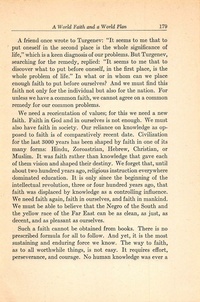 A World Faith and a World Plan 179
A World Faith and a World Plan 179
A friend once wrote to Turgenev: “It seems to me that to ' put oneself in the second place is the whole significance of life,” which is a keen diagnosis of our problems. But Turgenev, searching for the remedy, replied: “It seems to me that to discover what to put before oneself, in the first place, is the whole problem of life.” In what or in whom can we place enough faith to put before ourselves? And we must find this faith not only for the individual but also for the nation. For unless we have a common faith, we cannot agree on a common remedy for our common problems.
We need a reorientation of values; for this we need a new faith. Faith in God and in ourselves is not enough. We must also have faith in society. Our reliance on knowledge as opposed to faith is of comparatively recent date. Civilization for the last 3000 years has been shaped by faith in one of its many forms: Hindu, Zoroastrian, Hebrew, Christian, or Muslim. It was faith rather than knowledge that gave each of them vision and shaped their destiny. We forget that, until about two hundred years ago, religious instruction everywhere dominated education. It is only since the beginning of the intellectual revolution, three or four hundred years ago, that faith was displaced by knowledge as a controlling influence. We need faith again, faith in ourselves, and faith in mankind. We must be able to believe that the Negro of the South and the yellow race of the Far East can be as clean, as just, as decent, and as pleasant as ourselves.
Such a faith cannot be obtained from books. There is no
prescribed formula for all to follow. And yet, it is the most
sustaining and enduring force we know. The way to faith,
as to all worthwhile things, is not easy. It requires effort,
perseverance, and courage. No human knowledge was ever a
[Page 180]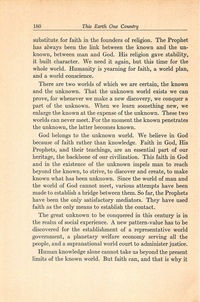 180 This Earth One Country
180 This Earth One Country
substitute for faith in the founders of religion. The Prophet has always been the link between the known and the unknown, between man and God. His religion gave stability, it built character. We need it again, but this time for the whole world. Humanity is yearning for faith, a world plan, and a world conscience.
There are two worlds of which we are certain, the known and the unknown. That the unknown world exists we can prove, for whenever we make a new discovery, we conquer a part of the unknown. When we learn something new, we enlarge the known at the expense of the unknown. These two worlds can never meet. For the moment the known penetrates the unknown, the latter becomes known.
God belongs to the unknown world. We believe in God because of faith rather than knowledge. Faith in God, His Prophets, and their teachings, are an essential part of our heritage, the backbone of our civilization. This faith in God and in the existence of the unknown impels man to reach beyond the known, to strive, to discover and create, to make known what has been unknown. Since the world of man and the world of God cannot meet, various attempts have been made to establish a bridge between them. So far, the Prophets have been the only satisfactory mediators. They have used faith as the only means to establish the contact.
The great unknown to be conquered in this century is in the realm of social experience. A new pattern-value has to be discovered for the establishment of a representative world government, a planetary welfare economy serving all the people, and a supranational world court to administer justice.
Human knowledge alone cannot take us beyond the present
limits of the known world. But faith can, and that is why it
[Page 181]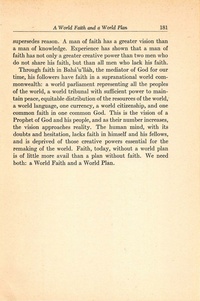 = A World Faith and a World Plan 181
= A World Faith and a World Plan 181
supersedes reason. A man of faith has a greater vision than a man of knowledge. Experience has shown that a man of faith has not only a greater creative power than two men who do not share his faith, but than all men who lack his faith.
Through faith in Baha’u’ll4h, the mediator of God for our time, his followers have faith in a supranational world commonwealth: a world parliament representing all the peoples of the world, a world tribunal with sufficient power to maintain peace, equitable distribution of the resources of the world,’ a world language, one currency, a world citizenship, and one common faith in one common God. This is the vision of a Prophet of God and his people, and as their number increases, the vision approaches reality. The human mind, with its doubts and hesitation, lacks faith in himself and his fellows, and is deprived of those creative powers essential for the remaking of the world. Faith, today, without a world plan is of little more avail than a plan without faith. We need both: a World Faith and a World Plan.
